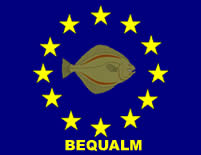 |
 |
||||
About BEQUALM
The Biological Effects Quality Assurance in Monitoring Programmes (BEQUALM) project was initiated in 1998 as an EU funded research programme. This project aimed to develop appropriate quality standards for a wide range of biological effects techniques and devise a method for monitoring compliance of laboratories generating data from these techniques for national and international monitoring programmes. The ultimate goal of this programme was to develop a Quality Assurance (QA) system for biological effects techniques which would be self-financing on the basis of fees recovered from participants. In essence, this would have similarities to QUASIMEME, which deals with quality issues in marine chemistry.
The research programme was completed in April 2002. A summary report outlines the aims, results and conclusions of this work.
The self-funded scheme was launched in September 2004. This scheme comprises three components:
Whole Organism Component – this is split into three parts:
Water and Sediment Bioassays - led by the Centre for Environment, Fisheries and Aquaculture Science (Cefas) Lowestoft Laboratory
Fish Disease - led by the Centre for Environment, Fisheries and Aquaculture Science (Cefas) Weymouth Laboratory
Luminescent Bacteria Assays – introduced in 2005 and led by the Centre for Research and Innovation in Toxicology (CRIT) at the Technical University of Catalonia
Biomarkers – led by the Norwegian Institute for Water Research (NIVA)
Community Analysis – this is split into two parts:
Benthic Community - led by the National Marine Biological Analytical Quality Control Scheme (NMBAQC) in the UK
Phytoplankton Analysis – introduced under the BEQUALM umbrella in 2005 and led by the Marine Institute in Galway, Eire
Each of these is responsible for establishing a QA programme, including preparation and distribution of reference materials, intercalibration exercises, results reporting, laboratory performance assessments and training and wash-up workshops as required.
Potential participants for any of the components are invited to join the scheme and should register their interest by emailing the BEQUALM Project Office. Further information will then be sent to you.